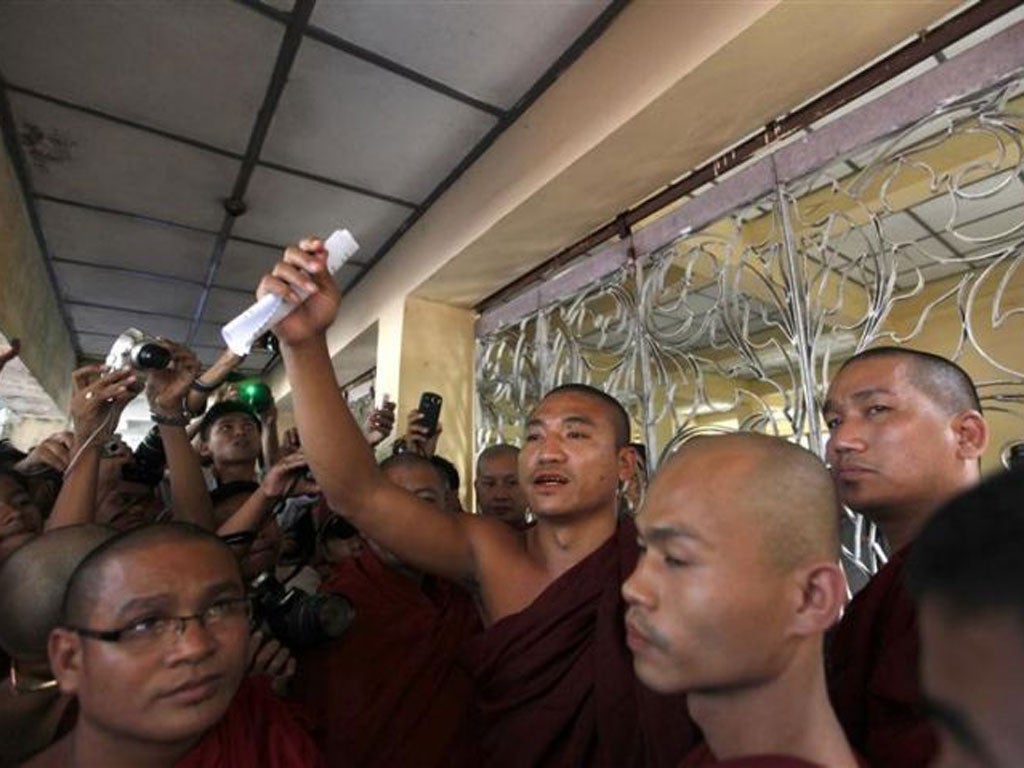Burma seizes protest leader monk weeks after his release in amnesty
Unrepentant activist behind Saffron uprising 'taken away' from monastery in night raid

A young monk who helped organise the 2007 "Saffron Revolution" has been detained by the Burmese authorities just weeks after he was released in a prisoner amnesty, a move that raises questions over the country's commitment towards reform.
Ashin Gambira, 33, was among hundreds of political prisoners freed last month by the government, cutting short a sentence of more than 60 years. But unlike many of the protesters, the outspoken monk has refused to soften his criticism of the government or his demands for more freedom.
Having been released after being sentenced to 68 years imprisonment, he set about reopening a number of monasteries that had been sealed or even damaged by the authorities following the 2007 uprising. Mr Gambira claimed they had permission to do so, but the authorities apparently disagreed.
According to information posted on the activist's Facebook page and quoting the monk's brother, Ko Aung Kyaw Kyaw, officials arrested him at around 2am, having gone to the Ledi monastery in Rangoon where he and others were staying. Mr Gambira's sister, Ma Lwin, who lives in a refugee camp in Thailand, confirmed that her brother had been taken but had no further details.
An official from the home ministry told the Associated Press that the monk had been "taken away for questioning in relation to incidents that happened after his release". Last night, there were no details about his whereabouts and whether he was to be charged or released.
The detention of Mr Gambira, and its nocturnal nature, will be of deep concern to observers of Burma as the country enters a sensitive period of change.
Since President Thein Sein came to office last year, heading a nominally civilian government, prisoners have been released, restrictions on the media lifted and even small protests allowed. The changes have earned widespread praise and seen a number of high-level diplomatic visitors make their way to Burma, as the West prepares to engage with the once-shunned nation.
Yet a number of commentators have questioned how deep and lasting the developments may be and have pointed out that as of yet there have not been any major legislative reforms.
When he was released from Myaungmya prison on 13 January, Mr Gambira told reporters he had been forced to endure solitary confinement and terrible conditions. "Burma still has a long way to go," he said. "Although they are releasing prisoners now, they still have characteristics of the dictatorship."
Since then, he has been formally readmitted to the monastic community after having his status stripped by the authorities while he was in jail.
According to a report on The Irrawaddy website, having initially moved into the Maggin monastery in Rangoon, known as a hotbed of anti-government activity during the 2007 uprising, the government-approved Buddhist Council subsequently ordered Mr Gambira and four other monks to leave. The council claimed the monastery had not received official permission to reopen.
The monk and his colleagues then moved to the nearby Ledi monastery but the council again disapproved, summoning Mr Gambira three times to make a formal apology. He ignored the calls.
Join our commenting forum
Join thought-provoking conversations, follow other Independent readers and see their replies
Comments